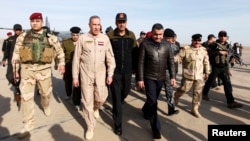From somewhere, a sniper opened fire on the seven battle-scarred Humvees of Iraqi Defense Minister Khaled al-Obeidi's convoy as they rode on a crater-pocked highway. The convoy's gunners replied with volleys of fire. The drivers did not stop.
Obeidi was proving a point by making his first visit to Iraq's biggest oil refinery, where a battle that broke a five month siege has been the main focus of the government's U.S.-backed fightback against Islamic State.
That the defense minister could now drive the 30 km (20 mile) desert highway to Baiji from an air base near Tikrit is one of the government's few military achievements since the army collapsed and abandoned most of northern Iraq in June.
Government troops and their Shi'ite militia allies finally lifted the siege of the refinery three weeks ago, after special forces troops held out, encircled inside the plant.
Along the road there is little sign of life. Unfilled craters from roadside bombs obstruct vehicles. A bridge spanning the dual carriageway has been blown up. By the roadside, electricity pylons have fallen and a communications tower is toppled. Some buildings are burnt out, or blown up.
Religious banners strung along the highway feature slogans and images lauding the Shi'ite militia - a jarring sight in a part of Iraq where most of the population are Sunni Muslims.
The short highway may be open between Tikrit and Baiji, but Tikrit, home town of the Sunni dictator Saddam Hussein, is still mainly in the hands of Islamic State fighters and so is most of the highway further south.
To reach Baiji, Obeidi had to fly first to the vast Al Sahra air field near Tikrit, named Speicher after a U.S. Navy pilot when it was the main U.S. base in northern Iraq during eight years of occupation.
Obeidi spent several hours close to the front lines, meeting officers and troops, asking about their food, sleeping quarters and salaries. At a checkpoint on the main northern entrance to Tikrit, he handed envelopes of money to one distressed soldier.
Two helicopters shadowed his movements throughout the trip.
At the entrance to Baiji refinery complex several fuel storage containers appear to have been burnt. Inside, large parts of the plant seemed undamaged but no workers could be seen operating machinery.
Appeal for more air support
When Islamic State fighters swept through the region in June, hundreds of mainly Shi'ite army recruits at Speicher gave themselves up and were machinegunned in mass graves by the ultra-radical Sunni Islamists.
The army's inability to defend the recruits at Speicher marked the lowest point in its capitulation to a seemingly unstoppable Islamic State advance.
Obeidi, a Sunni Muslim general and member of parliament, hails from Mosul, the biggest city in the north, now firmly under Islamic State control after it fell in the June advance.
He took over the defense portfolio in October after the appointment of new Prime Minister Haidar al-Abadi, who has made a priority of fixing the military and reducing the tension between the Shi'ite-led government in Baghdad and Sunnis.
Obeidi blames the collapse in the north on systemic corruption and a poor choice of army commanders, issues he said were being tackled.
Last week Abadi announced he had uncovered 50,000 “ghost soldiers” on the army payroll, who paid their officers part of their salaries and in return did not show up for duty, enriching their commanders and hollowing out the military force.
Since Abadi took office the army, backed by Shi'ite militias and security forces from the Kurdish autonomous region, has driven Islamic State from Jurf al-Sakhr town southwest of Baghdad and two towns near the Iranian border, as well as gaining ground in this area.
But Islamic State has consolidated control of Iraq's largest province, Anbar, which includes the mainly Sunni Euphrates valley west of Baghdad, and continued attacks elsewhere.
Obeidi said Iraq needed more support from the U.S.-led coalition whose jets have bombarded Islamic State positions. “They could weaken Islamic State's capabilities by 70 to 80 percent if they launched more air strikes,” he said.
Asked about Obeidi's remarks, the U.S. commander of coalition efforts against Islamic State said there were no immediate plans to step up air strikes: “As the Iraqis conduct operations, we'll continue to strike,” Lieutenant General James Terry said in Kuwait.
Outgoing U.S. Defense Secretary Chuck Hagel was in Baghdad on Tuesday for talks with Iraqi officials.
Fear of militias
At several stops on Obeidi's trip, the crackle of gunfire from ongoing fighting could be heard.
At Tikrit university, now home to troops instead of students on the northern outskirts of the city, soldiers said dozens of Islamic State fighters broke in on Friday after attacking from the north and east, across the River Tigris. They were pushed back after a whole day of fighting.
Nerves were also on edge on Monday outside Baiji, though the source of concern was not the hardline Sunni radicals but the Shi'ite militias Baghdad has depended on to push them back.
“In my home town, Islamic State would massacre me,” said Sabah al-Jubouri, a Sunni Muslim policeman. “But here, the 'popular masses' (Shi'ite militia) consider me to be Islamic State.”
He was speaking outside an office which coordinates the army's military campaign with the two main Shi'ite militias operating in this part of the province, Asa'ib Ahl al-Haq and Kata'ib Hezbollah.
“They don't work together with us,” complained Jubouri, whose home town of Sharqat to the north is still firmly in the grip of Islamic State.
More than a decade after the U.S.-led invasion toppled Saddam and ushered in years of sectarian bloodshed, a more cautious U.S. administration has pledged 3,100 soldiers, to act as trainers and advisers, not combat troops.
Jubouri said only resolute international intervention could rescue his country.
“Tell me, when are the Americans coming?”





